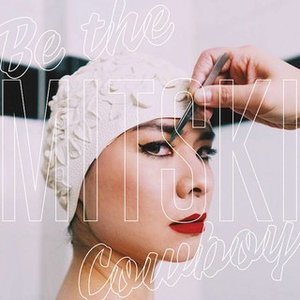Mitski: Be the Cowboy (Dead Oceans)
By mockingly sensationalizing her feelings, Mitski captures their heart
Released Aug 17th, 2018 via Dead Oceans / By Emilie Kneifel
 The essence of Be the Cowboy is distilled in this text from a friend: “I was listening to it earlier and I could also hear it from Kate’s room lol.†In other words: two housemates in adjacent rooms, steeping in what can’t be shared. On her newest album, Mitski doesn’t demolish the dividing wall; rather, she outlines what inhabits the interior. The shape loneliness can take when you’re your only reflection. When you look in the mirror and you watch yourself cry.
The essence of Be the Cowboy is distilled in this text from a friend: “I was listening to it earlier and I could also hear it from Kate’s room lol.†In other words: two housemates in adjacent rooms, steeping in what can’t be shared. On her newest album, Mitski doesn’t demolish the dividing wall; rather, she outlines what inhabits the interior. The shape loneliness can take when you’re your only reflection. When you look in the mirror and you watch yourself cry.The album begins as if you’re walking in on it, interrupting the organ mid-surge. There’s a screech of a glitch, then it drenches like a blaring sun. Mitski has, among other things, returned to the yearning piano of her first two albums and pasted on the white-smile artifice of show tunes and disco-pop. On Nobody, she somehow has you finger-snapping along to your own incorruptible loneliness, chanting “nobody/ nobody/ nobody†as if being sharply alone were suddenly something to revel in. But don’t be fooled: the same sincerity underlies her farce. By mockingly sensationalizing her feelings, she captures their heart. Because sometimes reality really is absurd hyperbole.
Mitski toys with love’s scarcity — how she needs “extra love" to "save till tomorrow's show†— and its conditions: how it dissipates after “all that I can do for them is done." How, really, nothing lasts, because we ourselves won’t endure: “All of the things I have seen will be gone/ with my eyes, with my body, with me.†On Two Slow Dancers: “The ground has been slowly pulling us back down/ You see it on both our skin.†She’s talking about aging, I guess. How skin sags. But I picture a different kind of descent: lovers floating, fluorescent blue, until the song ends. The glow of their skin dimming as their feet settle on the floor. Still twirling, strangers still. One of life’s little deaths.
For every irretrievable finality, there’s a bruised lingering. On Old Friend, someone “loves me now/ better than you;†still, she orders a coffee and “anything you wanna give me.†(“That pretty friend is finally yours and,†she breathes, her “finally†fluttering like a post-cry inhale.) She dons meticulous makeup on Lonesome Love, trying her best “to prove something,†to win — “and you say, ‘Hello’/ and I lose.†But Mitski’s longing isn’t lost. It’s lucid. She knows “no one will save me†and she knows “who you pretend I am.†She can admit that “nobody butters me up like you do/ and nobody fucks me like me.†The "and" implying coy continuity, which she promptly wrenches away. Proving there is power in articulating what consumes.
Mitski has managed to trace out so many limbs of reaching desire: we want to be remembered, to be loved and left alone. We want to “try again and again and again,†“to finally get somewhere I can be all done.†We want what destroys. We “want too much.†And maybe wanting “something bigger than the sky†which also rests “in my arms†is too much to ask. Maybe all desire depletes. But there is such beauty in unleashing it, if only aloud. The gust, and eruption. The spilling out from under every bedroom door. 9/10





 All Content RSS Feed
All Content RSS Feed
Follow Bearded on...